Islam Illuminates the World
Allah's revelation of the Qur'an to the Prophet Muhammad (may Allah bless him and grant him peace) fourteen centuries ago, together with the morality of Islam, taught the violent, barbaric, and ignorant people of the region peace, reason, and civilization.
At the beginning of the seventh century, Arabia was one of the world's most disordered places. Many tribes lived on these lands, and each of them worshipped a different idol. They would declare war on each another, shed much blood, and even kill children for their misguided beliefs and idols. Their belief system exalted ruthlessness, hate, and violence instead of love, compassion, and kindness. Women were considered lower beings, and the poor and the slaves were ruthlessly exploited.
 |
This dark and bloody world changed entirely with the arrival of Islam and its moral codes. Although the Arabs were the first to join Islam, many other nations soon embraced the light brought by its morality. The Qur'an's revelation enabled Muslims to achieve unequalled progress in science, culture, thought, and art. With the revelation of the Qur'an's first verse, the people of the region, who until this event had been stuck in a vicious circle of dark ignorance and bloody violence, were invited to read and think for the first time:
Recite: In the Name of your Lord Who created, created man from a clot of congealed blood. Recite: And your Lord is the Most Generous, He Who taught by the pen, taught man what he did not know. (Surat al-'Alaq: 1-5)
The structure of Arab society began to undergo a complete transformation with the arrival of Islam. For instance, Arab tradition decreed the death of all prisoners of war, whereas our Prophet (may Allah bless him and grant him peace), guided by Allah's revelation, ordered such prisoners to be treated well and fed from the Muslims' own rations. Allah reveals these Muslim qualities in the following verse:
They give food, despite their love for it, to the poor and orphans and captives. (Surat al-Insan: 8)
The only thing required of such prisoners was that if they could read and write, they had to teach these skills to the Muslims. Perhaps for the first time ever, Arabia was witnessing compassion, forgiveness, and civilization. As a result, it experienced one of its greatest periods of cultural advancement.
 |
| Before the advent of Islam, ignorance prevailed over Arab society. |
| In the Name of your Lord Who created, created man from clots of blood. Recite: And your Lord is the Most Generous, He Who taught by the pen. (Surat al-'Alaq:1-4) |
As the years passed, Islam's justice and high morality spread in waves across Arabia. The Muslims' fairness, honesty, and determination attracted many Arab tribes. The mighty Muslim army marched on Mecca in 630. Its idolatrous Meccans feared the vengeance that the Muslims would wreak upon them as retribution for their past cruelty. According to Arab tradition, the men of the defeated tribe were killed and the women and children enslaved. But our Prophet (may Allah bless him and grant him peace) reflected Allah's mercy by announcing that no one in Mecca would suffer retribution and that no one was to be forced to accept Islam. This act of forgiveness and compassion has attracted the attention of Western historians. In PBS documentary Islam: Empire of Faith, Michael Sells, a lecturer at Haverford University, relates our Prophet's (may Allah bless him and grant him peace) virtue in the following way:
When Mohammed came into Mecca, he not only did not carry out a bloody revenge, but actually embraced the very Meccans who had fought him for three years and attempted to annihilate him. It was very shocking to the people in his milieu. So within the very founding of a religion, one finds episodes of great generosity, often extraordinary acts of kindness and mercy.1
The important thing was to free the Meccans of their false beliefs. Therefore, our Prophet (may Allah bless him and grant him peace) headed straight for the Ka`bah, entered the holy mosque, and destroyed all of the idols inside. This event marked the end of idolatry and ended all of the cruelty, injustice, barbarism, and violence committed on its behalf. After being educated by the Qur'an, the Arabs replaced all of the pre-Islamic era's injustice, exploitation, and blood feuds with a new order based on respect, love, compassion, and justice among all people.
This era was later known as the "Blessed Period."
Justice and Compassion in Islamic Morality
Islam's rapid spread continued even after the Prophet's (may Allah bless him and grant him peace) death. Within a few decades, Islam spread to all of Mesopotamia and North Africa, and reached Spain in the west and India in the east.
The Arabs, who had been tending their flocks in the desert just a few decades ago, were now the rulers of an empire due to the reason, culture, and awareness they had acquired through Islam. This was the fastest growing empire ever. Within 100 years, the Muslim empire spread over an immense area and firmly established itself. In this huge geographic area, many different religious denominations existed side by side. Most of them, however, were composed of Christians and Jews. The Muslims, as a general rule, were always very compassionate toward all religious groups in their lands, did not force people to embrace Islam, and respected every person's freedom of conscience, for Allah says:
There is no compulsion where religion is concerned. (Surat al-Baqara: 256)
Churches and synagogues were protected. At a time when enforced proselytization was a common practice, such compassion was unique.
The Islamic Imprint c.800-1200 | ||
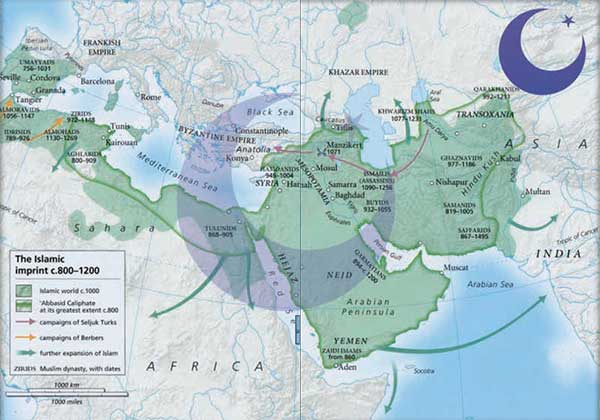 | ||
| FRANKISH EMPIRE | HAMDANIDS 945-1004 KHAZAR EMPIRE | Euphrates |
One of the most extraordinary examples of this compassion was the conquest of Jerusalem. The patriarch of the city's Church of the Holy Sepulcher feared that his church would be destroyed by the Muslims. Thus, Caliph `Umar visited the church and said that there was nothing to worry about. When the time for prayer came, he asked the patriarch for permission to leave so that he could pray nearby. The al-Aqsa mosque was built later on that very spot.
The Muslims gave Jerusalem one of the world's most spectacular works of architecture: the Qubbat as-Sakhrah (Dome of the Rock), which was built on the rock believed to be the place from where Prophet Muhammad (may Allah bless him and grant him peace) ascended to the heavens. The stunning motifs and golden dome of this architectural masterpiece reflects Islam's sense of art and civilization.
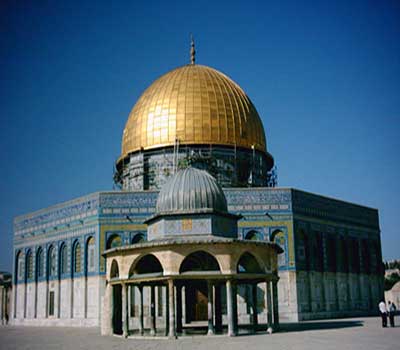 |
| Qubbat As-Sahra |
| Say: “We believe in Allah and what has been sent down to us and what was sent down to Abraham, Ishmael, Isaac, Jacob, and the Tribes; and what Moses and Jesus and all the Prophets were given by their Lord. We do not differentiate between any of them. We are Muslims submited to Him.” (Surah Al ‘Imran: 84) |
In this environment of compassion, non-Muslims were even given the democratic right to voice their complaints. During the Umayyad era, many Christians in Damascus (Sham) occupied important positions in the state bureaucracy and fulfilled their religious obligations as they wished. Some wrote even books that criticized Islam and Muslims without fear of retribution.
At the same time, Europe was governed by a dark fundamentalism and barbarism. The Catholic Church was oppressing the Jews and even Christians of other denominations. Forced proselytization, as well as torture and murder in the name of religion, were common. On the other hand, Muslims have always treated the People of the Book (Jews and Christians) with compassion, for Allah orders this in the Qur'an.
The St. John church of Damascus is another example of this compassion. The Muslims who conquered the region began to perform their Friday prayers in the church, and allowed the Christians to continue to use it for their Sunday services. Two separate faiths were sharing peacefully the same sanctuary. As the number of Muslims in the city grew, the Muslim leadership bought the church from the Christians with their consent. Next door, a mosque was built, and the décor of the forecourt buildings was enriched by Islamic motifs. Byzantine-era pillars were decorated with stunning examples of Islamic art.
Throughout the history of Islam, its compassion toward Jews and Christians continued. Jews fleeing the terror of the Spanish Inquisition found refuge and peace on Ottoman soil. The source and reason for such compassion was the morality of the Qur'an, for Muslims are told:
Only argue with the People of the Book in the kindest way—except in the case of those of them who do wrong—saying: "We believe in what has been sent down to us and what was sent down to you. Our God and your God are one, and we submit to Him." (Surat al-'Ankabut: 46)
Muslims and Science
 |
One of the lights of Islamic morality that illuminated humanity's path was scientific thought. Pre-Islamic Arab and some other Middle Eastern societies had never been concerned with the universe and how nature came to be or how it works. But this attitude changed with the Qur'anic revelation, for Allah tells people to inquire into the origins of the heavens and Earth:
[People with intelligence are] those who remember Allah, standing, sitting, and lying on their sides, and reflect on the Creation of the heavens and Earth [saying]: "Our Lord, You have not created this for nothing. Glory be to You! So safeguard us from the punishment of the Fire." (Surah Al 'Imran: 191)
This awareness started the scientific rise of Islamic civilization, and it then embarked upon a scientific journey like none ever seen before that time. Its powerhouse was Baghdad, capital of the Abbasid Empire and the Islamic world. Scientists, thinkers, researchers, and other scholars from all over the Islamic world came together in Baghdad's famous Dar al-Hikmah ("House of Wisdom") to research and investigate the secrets of Allah's universe.
This awareness that Muslim scientists acquired by adhering to the Qur'an's morality enabled history's most rapid leap in scientific progress until that time. Open-mindedness, a wisdom Muslims are taught by the Qur'an, enabled them to analyze and then develop further the scientific achievements of other civilizations without prejudice. Muslim scientific records were full of observations, experiments, calculations, and research on various subjects. In the schools of science, women were entitled to the same education as men and made their own scientific contributions.
Muslim mathematicians developed the decimal number system and invented algebra and trigonometry. Muslim scientists were very keen on astronomical observations, and thus discovered and established the principles of modern astronomy. Muslim scholars calculated the moon's orbit around Earth and recorded the formulas. The spectacular works of architecture throughout the Islamic world were made possible only by the scientific infrastructure put in place by the Muslims.
Some Muslim Scientists | |||
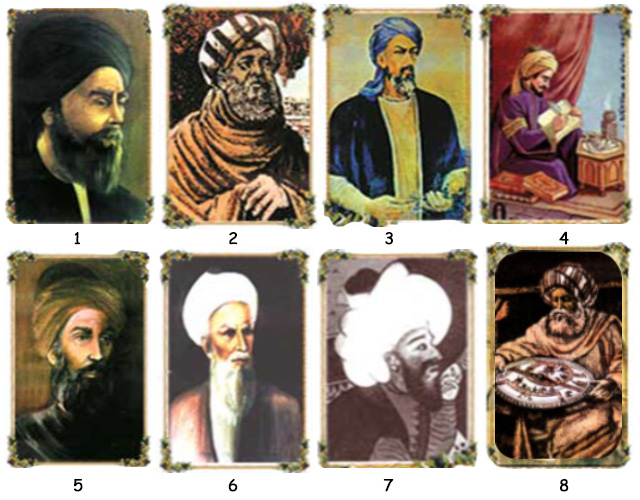 | |||
| 1. Ibn an-Nafis | 3. Ibn Sina | 5. Abu al-Qasim al-Zahrawi | 7. Ali Kushji |
Some of the Muslims' greatest achievements were in the field of medicine. Back then, ignorant Europeans considered illnesses to be a curse of evil spirits and so did not even have the concept of treating or actually curing the afflicted people. Muslim scientists, however, reached the research-based conclusion that illnesses were caused by tiny creatures invisible to the naked eye and that patients needed to be isolated from healthy people during their treatment. The world's first modern hospitals were conceived in this way. Muslim hospitals had different wards for different illnesses, and Muslim doctors had scientifically developed methods of treatment. Muslims treated mental illnesses with music and therapy, while Europeans believed that the mentally ill were satan's slaves and so burned them at the stake. Muslim reference works on the human anatomy were so accurate that they were used for 600 years in Europe's faculties of medicine.
 |
A documentary about the world of Islam, prepared for the BBC by the commentator Terry Jones, says the following on the high scientific standards of Islam:
One philosopher from the town of Harran for example had already correctly calculated the distance from the earth to the moon. Well another had suggested that if you could divide the atom, you'd release enough power to destroy city the size of Baghdad. In this medical school built here in Damascus in 1154, doctors were already teaching anatomy, inventive medicine, hygiene surgery, the circulation of the blood, centuries before Harvey.2
Centuries before their European counterparts, Muslim physicians knew about blood circulation and took their patients' pulses during their examinations. Childbirth took place under the most hygienic conditions possible at the time. Surgical instruments, as depicted in medical books of the era, are evidence of advanced medical knowledge.
Muslim scientists made important discoveries in optics and the nature of light. The first person to reveal the eye's structure in detail was Ibn al-Haytham, whose extraordinary research on lenses cleared the way for the camera's invention. Muslim physicians discovered the reasons behind sight impairments and performed successful cataract surgery 1,000 years before any European physician.
The great scientific heritage of the Islamic world made the European Renaissance possible. Christian scientists established European schools of science with the knowledge and methods acquired from Muslims. The light of Islam also illuminated them.
The Splendor of Islamic Civilization
 |
| 1. Ali Kushji, supported by Sultan Mehmed II, was famous for his astronomical works. 2-3. Miniature paintings showing the astronomical works of Muslim scientists. |
One quality acquired from Islam's morality is the high sense of art and esthetics. The Qur'anic depictions of Paradise are pictures of the highest quality, finest taste, and stunning grandeur. Muslims had this sense of art in their hearts, which is reflected in their work, and thus the lands they ruled became the world's most modern and select regions. When Islam spread outward in all directions, it brought prosperity and development with it.
Muslims took civilization wherever they went. They designed an effective water purification system for the drinking water requirements of a Tunisian town. Water was stilled and purified in two large basins and then brought into the town by an enclosed pipe system. Only centuries later did Europeans began to concern themselves with such things. Muslim engineers in Syria designed a fantastic system of watermills to deliver water to the cities.
The capital of the Islamic world, Baghdad, was the world's most splendid and modern city. Urban planning and architecture were stunning. A traveler visiting Baghdad wrote the following:
All the exquisite neighborhoods covered with parks, gardens, villas and beautiful promenades are filled with bazaars and finally built mosques and baths. They stretch for miles on both sides of the glittering river.3
Andalusia (Muslim Spain), another spectacular center of the Islamic world, gradually became Europe's most modern and advanced country. Its capital city of Cordoba was full of amazing beauty with its clean, well-lit streets, libraries, hospitals, and palaces.
In the same era, such great European cities as Paris and London were filthy, dark, and neglected. As a result, European Christians visiting Cordoba were amazed and dazzled by the city's splendor, culture, and art.
In Islam: Empire of Faith, Historian Sheila Blair of Boston College describes Cordoba's splendor with the following words:
The city of Cordoba in the 9th and 10th centuries was one of the biggest and most exciting in Europe. We have descriptions by people coming and seeing all of these flowers everywhere this open streets, this wonderful light coming down. Northern cities were dark. Cordoba had running water. People lived in big houses. In contrast, in Paris, people lived in shacks by the side of the river. 4
 |
| While Muslims treated their patients in extremely clean and well-kept hospitals, patients in Europe were abandoned to death. A front view of the famous Mansur Hospital at that time (to the left). The picture showing the streets of Venice at the same period reveals the civilizational gap between the two worlds. |
One of the few remaining examples of Cordoba's grandeur is the Catholic cathedral located in the city center. Originally it was a mosque of an esthetic style that captivated the minds of those who entered it. Christian explorers who came to Cordoba were deeply affected by this splendor. In the tenth century, a Saxon nun by the name of Hrotsvitha described Cordoba as the ornament of the world.
One of Andalusia's most spectacular buildings was the Alhambra palace, which was decorated with stunning examples of Islamic esthetics and art. Every detail reflected the same fine taste of Islam's higher spirit. Its gardens were full of fountains powered by a system based on gravity. The Muslims who built it were inspired by the Qur'anic depictions of Paradise.
Here are some verses about Paradise:
They will have preordained provision: sweet fruits and high honor in Gardens of Delight on couches face to face; a cup from a flowing spring passing round among them, as white as driven snow, delicious to those who drink, which has no headache in it and does not leave them stupefied. (Surat as-Saffat: 41-47)
[They will be] shaded by spreading branches. (Surat ar-Rahman: 48)
They will be reclining on couches lined with rich brocade, the fruits of the Gardens hanging close to hand. (Surat ar-Rahman: 54)
[Gardens of Paradise are] of deep viridian green. (Surat ar-Rahman: 64)
[They are] on sumptuous woven couches, reclining on them face to face. (Surat al-Waqi'a: 15-16)
[They are] Amid thornless lote-treesand fruit-laden acacias. (Surat al-Waqi'a: 28-29)
And wide-spreading shade and outpouring water and fruits in abundance never failing, unrestricted. And [they are] on elevated couches. (Surat al-Waqi'a: 30-34)
They will have Gardens of Eden with rivers flowing under them. They will be adorned in them with bracelets made of gold and wear green garments made of the finest silk and rich brocade, reclining there on couches under canopies. What an excellent reward! What a wonderful repose! (Surat al-Kahf: 31)
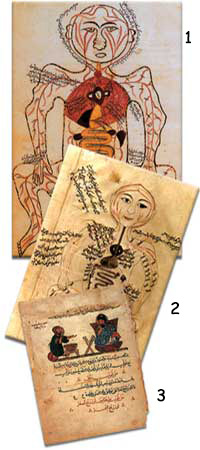 |  |
| Drawings of Muslim scholars showing human anatomy and the digestion and circulation systems. | Muslim scholars in the field of medicine had a high level of knowledge. Their works became basic reference books throughout Europe. The diagram used by Muslim scientists in treating broken bones |
Examples from Muslim scientists' works | |
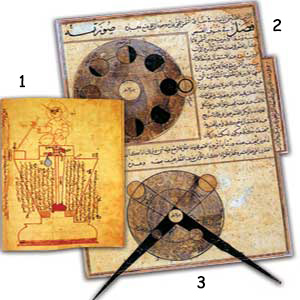 | 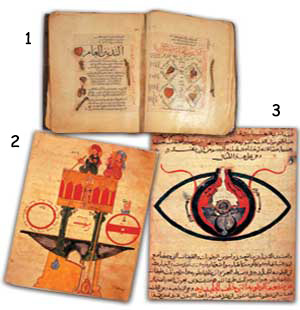 |
| 1. Apparatus designed by al-Haskafi to measure changing water levels. 2-3. The drawings used by Muslim scientists to calculate solar and lunar eclipses. | 1. Ibn Sina's notebook in the National Museum of Damascus. 2. The apparatus designed by Muslim scientists to measure blood pressure. 3. Al- Mutadibih's work on the eye's anatomy. |
Islamic Civilization and the Ottomans
 |
| The hilya below belongs to a special collection. The other ornamental objects of the sixteenth and the seventeenth centuries are displayed in the Turkish Islamic Art Museum. |
The Ottoman Empire, founded in 1299, was developing as one of the Islamic world's greatest and grandest empires. The official Ottoman worldview, based on compassion and justice, left its mark on the lands it ruled with its sublime architecture, textiles, calligraphy, and a perfected educational system envied by Europe. The sultans' subtlety and taste in art was admired by Europeans, who were deeply affected by the Ottoman Empire's splendor.
The Ottoman Empire was one of the largest and longest-lived empires. In fact, only the Roman Empire at its peak covered a greater area. However, it did not manage to preserve its size as long as the Ottomans did. Many countries that now form parts of Europe, North Africa, Central Asia, and the Middle East have historically important Ottoman monuments and artwork decorating their towns. Examples of Ottoman architecture and urban planning are still standing in many European cities (e.g., Sofia, Belgrade, and Sarajevo).
The Ottoman state and governing system was based on the Qur'an, and many present-day political scientists refer to it as one of the best state systems. Ottoman state diplomacy formed the basis of the modern era's multi-track diplomacy.
Ottoman civilization had a direct impact on Western European culture: The Ottomans introduced rice farming to Hungry, the Habsburg envoy Busbecq introduced tulips to the Benelux countries after visiting Istanbul in the sixteenth century, the Italians acquired their fabric weaving and dying techniques from the Ottomans, and the Ottomans introduced the tradition of military bands to Europe.5
These historical facts show that Islamic morality played a leading role in the modern world's development. From the very beginning of its revelation, Islam has served as a guiding light, leading humanity to truth, reality, and beauty. The Muslims took their morality with them wherever they went, along with compassion, reason, science, art, esthetics, hygiene, and prosperity. At a time when Europe was sunk in dark dogmatism and barbarism, the Islamic world was the world's most advanced and modern civilization. The values acquired by individual Europeans from the world of Islam played a fundamental role in developing European civilization. Historian Eugene Myers expresses this reality in the following way:
... From the late ninth century until the twelfth, Islamic influence on Western science and culture was great ... The cultural importance of the work of Islamic scholars and translators for the development of science and humanities can hardly be overestimated … Thus, the roots of Western thought are a mixture of Greco-Arabic and Hebrew thought. 6
 |
| In them are two gushing springs. (Surat ar-Rahman: 66) |
On the other hand, one of the major reasons why the Islamic world fell behind in some respects was because it became estranged from the reason, sincerity, and open-mindedness taught in the Qur'an. We say this because the Qur'an is the greatest source of guidance leading humanity out of darkness of ignorance and into the light of true knowledge. As Allah revealed to our Prophet (may Allah bless him and grant him peace):
Alif Lam Ra. This is a Book We have sent down to you so that you can bring mankind from the darkness to the light, by the permission of their Lord, to the Path of the Almighty, the Praiseworthy. (Surah Ibrahim: 1)
Present-day Muslims should know the splendid past of Islamic civilization and honor the responsibility that comes with it. Let's not forget that Muslims are the representatives of a sacred, glorious, and honorable heritage that built one of the greatest civilizations on Earth. Moreover, they have always been envied and admired in equal measure by the representatives of other civilizations or religious denominations. The famous Middle East expert Daniel Pipes speaks of the Muslims' confidence in one of his articles:
Contributing to this internal confidence is the memory of outstanding achievements during Islam's first six or so centuries. Its culture was the most advanced, and Muslims enjoyed the best health, lived the longest, had the highest rates of literacy, sponsored the most advanced scientific and technical research, and deployed usually victories armies. This pattern of success was evident from the beginning: in A.D. 622 the Prophet Muhammad fled Mecca as a refugee, only to return eight years later as its ruler. As early as the year 715, Muslim conquerors had assembled an empire that extended from Spain in the west to India in the east. To be a Muslim meant to belong to a winning civilization.7
Muslims today should not just bask in the glory of their past, but must work to help the Islamic world rise once again. Of course Muslims can build a similarly splendid and world-illuminating culture and civilization again, but not until they recreate the spirit of unity and solidarity that drove their predecessors. If they can establish a democratic, constructive, and peace-loving culture that works only for the benefit of Islam and humanity and disregards personal interests, they can build the greatest civilization of the twenty-first century. Thanks to the core values of Islamic morality (e.g., love, compassion, and sympathy), the despotic regimes ruling Muslim lands will fall; cultural and economic development will be achieved; Muslims suffering from oppression, cruelty, and even cold-blooded massacre will find peace and security; and a new "Blessed Period" will become a reality.
We placed between them and the cities We had blessed other clearly conspicuous cities, making them measured stages on the way:
"Travel between them in safety by night and day."
(Surah Saba':18)
We have established you firmly on the earth and granted you your livelihood in it. What little thanks you show!
(Surat al-A’raf: 10)
Allah commands justice and doing good and giving to relatives.
And He forbids indecency and doing wrong and tyranny.
He warns you so that hopefully you will pay heed.
(Surat an-Nahl: 90)
Say: “My Lord has commanded justice.
Stand and face Him in every mosque and call on Him, making your religion sincerely His. As He originated you, so you will return.”
(Surat al-A’raf: 29)
Footnotes
1. "Islam: Empire of Faith." An Empires Special, PBS Home Video.
2. Ibid.
3. Ibid.
4. Ibid.
5. L Carl Brown, ed. Imperial Legacy: The Ottoman Imprint on the Balkans and the Middle East (Columbia University Press: 1997).
6. Eugene A. Myers, Arabic Thought and the Western World in the Golden Age of Islam (New York: Frederick Ungar, 1964), 10, 133, 134.
7. Daniel Pipes, "Islam and Islamism," The National Interest (Spring 2000).
- Foreword to the Second Edition
- Foreword
- Introduction
- Islam Illuminates the World
- Why a Turkish Islamic Union?
- What Kind of Turkish Islamic Union
- The Benefits of Turkish Islamic Union for Muslims
- The U.S., the Middle East And the Turkish Islamic Union
- The Turkish Islamic Union and the West
- The Good News of the Turkish Islamic Union
- Conclusion
